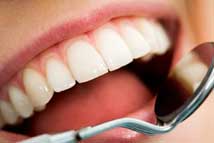During my dental career I have noticed that upon meeting a new patient I am often greeted with the same remark: “This has nothing to do with you… but I hate going to the dentist.” I have long since learned that in reality it’s not in fact an offensive remark, but more or less a clearing of the air and really just addressing the elephant in the room. It is common knowledge that the majority of the population dislikes going to the dentist, and the main reasons are not because of the actual dentist and their performance. Read on for the top 5 reasons why people hate the dentist.
I have long since learned that in reality it’s not in fact an offensive remark, but more or less a clearing of the air and really just addressing the elephant in the room. It is common knowledge that the majority of the population dislikes going to the dentist, and the main reasons are not because of the actual dentist and their performance. Read on for the top 5 reasons why people hate the dentist.
- Small space with too many people in it. Dental work is completed in close quarters and commonly your dentist or hygienist is sitting quite close to you. Their face is mere inches from yours and often accompanied by an assistant. Needless to say, some simply cannot feel comfortable with someone in their personal space. Especially someone with pointy instruments! If you find that you feel a little claustrophobic in the dental office let your dentist or hygienist know. The best way to ease anxiety is to be honest about what makes you most uncomfortable, this gives you and your dentist the opportunity to address it and find a solution to make you more comfortable.
- Everything smells and tastes weird there. Well, this category really is self explanatory. The dental office has an odd aseptically clean smell and feel to everything in it. Some people love it, some people hate it, and some people may never have noticed it before. But, when entering a dental office it is a good thing to be greeted with a fresh aseptic smell with clean dressings and fresh instruments.
- What if it hurts? The fear of the unexpected, this is one of the top reasons some find dentistry uncomfortable. Even though 99% of their appointments are quick and pain free, that 1% can set the precedent for future dental experiences spent simply waiting for something to occur. By finding a dentist you trust and feel comfortable with this dental fear can be minimized. Although, most people who have a slight dental anxiety will feel uncomfortable in the dental office, the right dentist can put you at ease. And, if needed offer solutions to ease your anxiety during treatment if necessary.
- They’re going to tell me I have a cavity. For some, the simple possibility of being told you aren’t doing a good enough job with your home care, or that you’ll have some need for more dental work, can cause people to come in with soured expectations. Although this is a tough situation to avoid it is best to keep up with your regular hygiene appointments so that your dentist and hygienist can give you helpful advice in order to avoid more complex and invasive dental treatment. Also, it is much better to have a small cavity filled rather than wait until it becomes a large cavity or something more complicated such as a root canal treatment.
- I don’t like being numb. There really is no confusion as to why this one is on the list. It can be nerve wracking getting an injection and then dealing with the resulting numbness of your lip, tongue and cheek afterwards. But, that being said there is nothing like having pain free dentistry completed!

